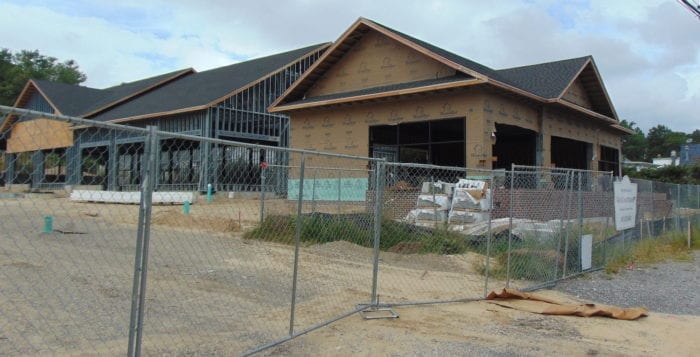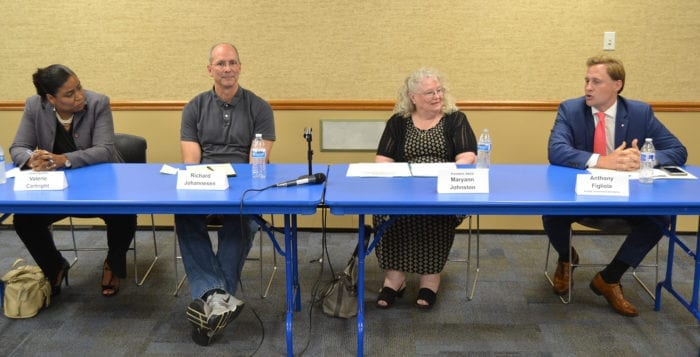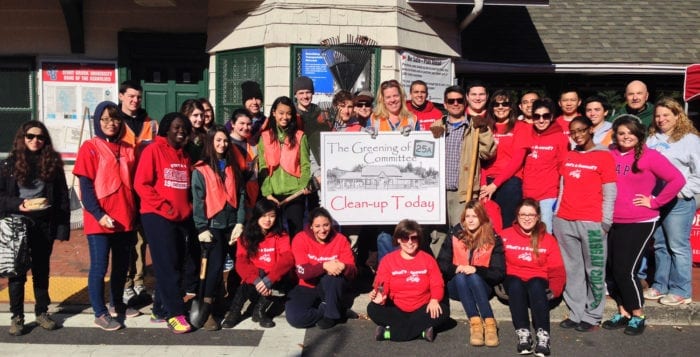A supermarket chain’s requests of the Town of Brookhaven Planning Board are creating concerns in East Setauket from a historical and environmental perspective.
“We’re really concerned that this kind of dark color is going to contrast with the historic district, and it won’t be in conformity with a lot of the architecture of the other buildings.”
— George Hoffman
Peggy Kelly, of Kelly’s Expediting Corp., representing Stop & Shop, attended the Oct. 15 planning board meeting asking for a facade color change to three Stop & Shop stores in Brookhaven — Medford, Farmingville and East Setauket — and switching the location of the East Setauket bottle redemption area from the front of the store to the back.
The color change would mean the facade of the Route 25A store in East Setauket would go from sandstone to gray. Kelly said the facade will change at eight Brookhaven stores, and it has already been altered in 21 locations in Suffolk County.
“Currently Stop & Shop is going through a refreshing,” Kelly said. “What they’re trying to do is develop an image which to the customer — the consumer — is going to [be] more fresh, green and a more healthy look.”
George Hoffman, first vice president of the Three Village Civic Association, was on hand for the planning board meeting and said the civic was opposed to the new color scheme that would be painted over the current beige sandstone for the majority of the building. He said the gray the representatives from the civic group were shown seemed to be a dark slate and not a light shade and would stand out. The applicant is also applying to paint the rest of the shopping center gray.
“We’re really concerned that this kind of dark color is going to contrast with the historic district, and it won’t be in conformity with a lot of the architecture of the other buildings,” Hoffman said.
State Assemblyman Steve Englebright (D-Setauket) submitted a letter to the planning board stating that the proposed color change would be contrary to the historic character of the community.
“A dark gray facade would stand out in our retail area and draw attention in a manner that would work against architectural cohesion and continuity,” Englebright wrote.
Hoffman said the civic also had an issue with the changing of the bottle redemption center location since it will be harder to get to.
“A dark gray facade would stand out in our retail area and draw attention in a manner that would work against architectural cohesion and continuity.”
— Steve Englebright
“There’s a small little alleyway — well driveway — that leads to the back,” Hoffman said. “You have to pass by the truck loading zone and the trash compactor and now they’re going to put it in the back parking lot. At a time when we should be encouraging recycling you don’t want to make it harder for people to bring back their bottles.”
Englebright in his letter said the current bottle return location in the front of the store is in an ideal spot as it’s convenient and accessible to customers walking from the parking lot. He wrote that he believes changing the location to the rear of the store would lead to a reduction in recycling since Stop & Shop is the only supermarket in the Setauket/East Setauket area.
Kelly said the bottle redemption center being moved to the back would give customers a larger space and prevent congestion in front of the store. She said if the board didn’t agree to the change, the location could remain in the front.
Kelly added East Setauket was the only location with a question about the color change. All other Brookhaven civic associations or council members who have reached out to their communities have approved the new color scheme.
The board tabled the decision until the next planning board meeting Nov. 5 and asked that Stop & Shop representatives meet with the Three Village Civic Association.
Both the chain and civic are open to the suggestion, and Hoffman said they will meet before the end of the month.
“We are aware of civic concerns regarding a possible color change and bottle deposit relocation at our Setauket store,” said Steve Kienzle, senior vice president of market operations and sales for Stop & Shop. “We are reviewing all options so that we can bring the situation to a resolution.”










